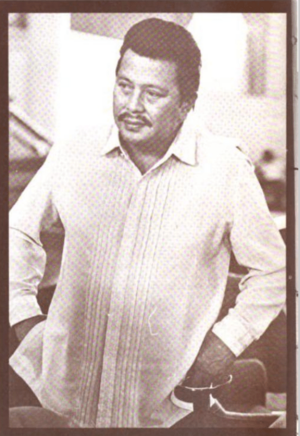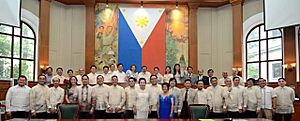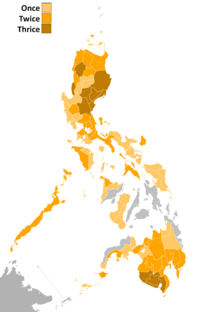Joseph Estrada facts for kids
Quick facts for kids
Joseph Estrada
|
|
|---|---|
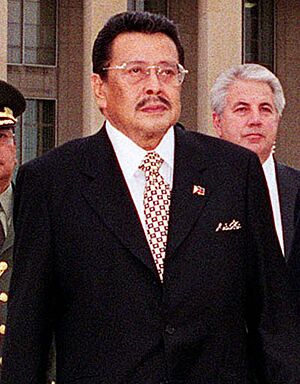
Estrada in 2000
|
|
| 13th President of the Philippines | |
| In office June 30, 1998 – January 20, 2001 |
|
| Vice President | Gloria Macapagal Arroyo |
| Preceded by | Fidel V. Ramos |
| Succeeded by | Gloria Macapagal Arroyo |
| 9th Vice President of the Philippines | |
| In office June 30, 1992 – June 30, 1998 |
|
| President | Fidel V. Ramos |
| Preceded by | Salvador Laurel |
| Succeeded by | Gloria Macapagal-Arroyo |
| 26th Mayor of Manila | |
| In office June 30, 2013 – June 30, 2019 |
|
| Vice Mayor |
|
| Preceded by | Alfredo Lim |
| Succeeded by | Isko Moreno |
| 18th Secretary of the Interior and Local Government | |
| In office June 30, 1998 – April 12, 1999 |
|
| President | Himself |
| Preceded by | Sonny Collantes (OIC) |
| Succeeded by | Ronaldo Puno |
| Chairman of the Presidential Anti-Crime Commission | |
| In office 1992–1997 |
|
| President | Fidel V. Ramos |
| Senator of the Philippines | |
| In office June 30, 1987 – June 30, 1992 |
|
| 14th Mayor of San Juan | |
| In office August 5, 1969 – March 26, 1986 |
|
| Preceded by | Braulio Santo Domingo |
| Succeeded by | Reynaldo San Pascual |
| Personal details | |
| Born |
Jose Marcelo Ejercito
April 19, 1937 Tondo, Manila, Philippines |
| Political party | PMP (since 1991) |
| Other political affiliations |
|
| Spouse | |
| Children | 11 (incl. Jose Jr., Joseph Victor, Jude and Juan Emilio) |
| Parent | Emilio Ejercito Sr. (Father) Maria Marcelo (Mother) |
| Relatives | Ejercito family |
| Residence | Santa Mesa, Manila |
| Alma mater |
|
| Occupation |
|
| Profession | Businessman |
| Signature | |
Joseph Ejercito Estrada (born Jose Marcelo Ejercito; April 19, 1937), also known as Erap, is a Filipino politician and former actor. He served as the 13th president of the Philippines from 1998 to 2001. Before becoming president, Estrada was the ninth vice president of the Philippines from 1992 to 1998. He also served as the 22nd mayor of Manila from 2013 to 2019, and the 14th mayor of San Juan from 1969 to 1986.
Estrada became very popular as a film actor, starring in over a hundred movies during his three-decade career. He also worked as a model when he was 13. His fame as an actor helped him in politics. He was mayor of San Juan, then a senator, and later vice president under President Fidel V. Ramos.
In 1998, Estrada was elected president with many votes. He took office on June 30, 1998. ..... Later, he faced accusations of misusing public funds, which led to an impeachment trial. In 2001, he left the presidency during the Second EDSA Revolution. After his arrest, his supporters held rallies, which led to events known as EDSA III.
In 2007, Estrada was found responsible for misusing government funds but was later pardoned by President Gloria Macapagal Arroyo. He ran for president again in 2010 but lost. He then served as the mayor of Manila for two terms, from 2013 to 2019.
Contents
- Early Life and Education
- Film Career and Public Service
- Entry into Politics
- Vice Presidency (1992–1998)
- Presidency (1998–2001)
- After the Presidency (2001–Present)
- 2010 Presidential Election
- Mayor of Manila (2013–2019)
- Electoral History
- Personal Life and Family
- Awards and Honors
- Images for kids
- See also
Early Life and Education
Jose Marcelo Ejercito was born on April 19, 1937, in Tondo, Manila, a busy part of Manila. His family later moved to San Juan, Metro Manila, which was a municipality in Rizal province at the time. He came from a well-off family and was the eighth of ten children. His parents were Emilio Ejercito Sr. and Maria Marcelo.
After finishing elementary school in 1951, he was expelled from high school for disciplinary reasons. He later tried studying Civil Engineering at Mapúa University and Central Colleges of the Philippines but did not finish his studies.
In his twenties, he started acting, often playing the role of a villain. He chose the stage name "Joseph Estrada" because his mother didn't approve of his acting career. He also got the nickname "Erap" from his friend, actor Fernando Poe Jr.. "Erap" is a playful way of saying "pare," which means 'buddy' in Tagalog.
Film Career and Public Service
When he was in his twenties, Joseph Ejercito started acting in movies. He chose the stage name "Joseph Estrada" because his mother did not approve of his acting career. His friend, actor Fernando Poe Jr., gave him the nickname "Erap," which means "buddy" in Tagalog slang.
Estrada became a very popular actor, starring in more than a hundred films over about 30 years.
In 1974, Estrada started the Movie Workers Welfare Foundation (Mowelfund). This foundation helps people who work in the film industry with medical care, housing, and other support. Its school, the Mowelfund Film Institute, has trained many talented filmmakers since 1979. He also helped start the first Metro Manila Film Festival in 1975.
Entry into Politics
Mayor of San Juan (1969–1986)
Estrada first tried to become mayor of San Juan in 1967 but won in 1969 after a special election protest. As mayor, he made many improvements to the town. He built the first Municipal High School, a modern market, and a government center. He also paved most of the town's roads.
He focused on improving elementary education by fixing school buildings and adding new ones. He also built health centers and playgrounds. He helped about 1,800 families move from San Juan to Taytay, Rizal, without any cost to them. He was also the first mayor to use computers for property tax assessments. In 1986, when Corazon Aquino became president, all local elected officials, including Estrada, were replaced.
Senator of the Philippines (1987–1992)
In 1987, Estrada was elected as a Senator. He was in charge of the Committee on Public Works. He also helped with committees on health, natural resources, and urban planning.
As a senator, Estrada supported projects for irrigation and protecting the carabao, which is an important animal for farmers.
In 1991, Estrada and eleven other senators voted to end the agreement that allowed American military bases in the Philippines. This led to the American soldiers leaving Clark Air Base and Subic Naval Base.
In 1989, a magazine called him one of the "Three Outstanding Senators of the Year." He also received honorary degrees from two universities.
Vice Presidency (1992–1998)
In 1992, Estrada first planned to run for president. However, he later decided to run for vice president instead, as the running mate of Eduardo Cojuangco Jr.. Even though Cojuangco lost the presidential race, Estrada won the vice-presidency with many votes.
As vice president, Estrada led President Ramos' Presidential Anti-Crime Commission (PACC). He helped arrest criminal groups. He was often ranked as one of the best-performing government officials in surveys. In 1997, he stepped down from leading the PACC.
In the same year, Estrada joined former president Corazon Aquino and other leaders in a large rally against changes to the constitution. About half a million people gathered in Rizal Park to protest.
Presidency (1998–2001)
On June 30, 1998, Joseph Estrada became the 13th President of the Philippines. He took his oath in Malolos, Bulacan, a historic town. He promised to bring peace and fight corruption. His campaign slogan was "Erap Para sa Mahirap," which means "Erap for the Poor." He used a special name as his official address, combining his family name Ejercito with his screen name, becoming "Joseph Ejercito Estrada."
He took office during the Asian Financial Crisis, which affected the country's economy. However, the economy started to recover during his term. In 2000, he declared an "all-out-war" against the Moro Islamic Liberation Front and captured their main camps.
In January 2001, there was a lot of political unrest in the country. The head of the Armed Forces, Angelo Reyes, decided to withdraw his support for Estrada and support Vice President Gloria Macapagal Arroyo instead.
End of Presidency
The next day, the Supreme Court declared the presidency vacant, stating that Estrada had left the office. Soon after, Gloria Macapagal Arroyo was sworn in as the new president. The Supreme Court later confirmed that Estrada's departure was constitutional.
After the Presidency (2001–Present)
Arrest and Public Rallies
After leaving the presidency, Estrada went back to his home in San Juan.
On April 25, 2001, he and his son Jinggoy were arrested. His supporters marched to the EDSA Shrine to protest. They demanded Estrada's release and that he be put back as president. Many people, including his wife Loi Ejercito and political allies, joined the protests.
In the early morning of May 1, Estrada's supporters marched to Malacañang Palace. Violence broke out, and President Arroyo declared a state of rebellion. Many protesters and journalists were hurt. The government used tear gas and warning shots to control the riots. These events became known as EDSA III.
Estrada was held in different places, including a hospital and a military facility, before being placed under house arrest.
Pardon and Release
On October 22, 2007, Estrada asked President Arroyo for a "full, free, and unconditional pardon." He mentioned his mother's health as a reason for his request.
On October 25, 2007, President Arroyo granted Estrada executive clemency. This meant he was pardoned and his civil and political rights were given back. Estrada had promised not to seek public office again. On October 26, 2007, after almost seven years, Estrada was released.
Activities After Release
After his release, Estrada gave a message to the Filipino people. He said he wanted to help people, especially the poor. He admitted making mistakes as a public servant. He then went on a "Lakbay Pasasalamat" (Thank you tour) across the country. During this tour, he thanked his supporters and gave out relief goods like food and medicine.
2010 Presidential Election
In 2009, Estrada announced that he would run for president again in the 2010 Philippine presidential election. His running mate was Makati Mayor Jejomar Binay. However, he lost the election to Senator Benigno Aquino III.
Mayor of Manila (2013–2019)
In May 2012, Estrada decided to run for Mayor of Manila in the 2013 elections. He won the election and became mayor on June 30, 2013. When he started his term, the city government had a lot of debt. During his first term, he worked to improve the city's finances and declared Manila debt-free by 2015. He also started programs to revive areas like Escolta Street.
He initially planned to serve only one term but decided to run for reelection in 2016. He won a close race against former Mayor Alfredo Lim. As mayor, Estrada focused on providing basic services to the people of Manila, from free hospital care for mothers to free books and snacks for public school students.
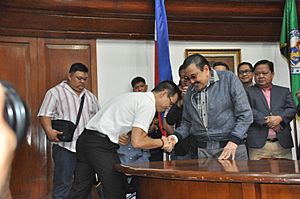
He also supported projects to reclaim land in Manila Bay. In 2018, he settled the city's unpaid tax debts from previous mayors. In the 2019 elections, Estrada ran for a third term but lost to former Manila vice mayor Isko Moreno Domagoso. He stepped down from office on June 30, 2019.
Electoral History
San Juan Mayoralty Elections
- Estrada won every mayoralty election in San Juan from 1969 to 1984.
Senatorial election, 1987:
- Joseph Estrada (GAD) – 10,029,978 (14th place)
Vice Presidential election, 1992:
- Joseph Estrada (PMP) – 6,739,738 (33.00%)
Presidential election, 1998:
- Joseph Estrada (LAMMP) – 10,722,295 (39.86%)
Presidential election, 2010:
- Benigno Aquino III (Liberal) – 15,208,678 (42.08%)
- Joseph Estrada (PMP) – 9,487,837 (26.25%)
Manila Mayoralty Elections 2013
- Joseph Estrada (PMP) – 349,770
Manila Mayoralty Elections 2016
- Joseph Estrada (PMP) – 283,149
Manila Mayoralty Elections 2019
- Isko Domagoso Moreno (Asenso Manileño) – 357,925
- Joseph Estrada (PMP) – 210,605
Personal Life and Family
Estrada is the first Philippine president who was also a popular actor. He is married to Dr. Luisa "Loi" Pimentel, a former First Lady and senator. They have three children:
- Jinggoy Estrada, who has been a mayor and senator.
- Jackie Ejercito
- Jude Estrada
Estrada also has eight children from other relationships. These include:
- Joseph Victor "JV" Ejercito, who became mayor of San Juan.
- Jerika, Jacob, and actor Jake Ejercito with former actress Laarni Enriquez.
Many of Estrada's relatives have also become well-known in politics and entertainment.
Awards and Honors
National Honors
 : Order of the Knights of Rizal – Knight Grand Cross of Rizal.
: Order of the Knights of Rizal – Knight Grand Cross of Rizal.- 1975 Metro Manila Film Festival Best Actor for Diligin mo ng Hamog ang Uhaw na Lupa
- 1962 FAMAS Best Actor for Markang Rehas
- 1964 FAMAS Best Actor for Geron Busabos
- 1965 FAMAS Best Actor for Ito ang Maynila
- 1966 FAMAS Best Actor for Sapang Palay
- 1969 FAMAS Best Actor for Galo Gimbal
- 1971 Outstanding Mayor and foremost Nationalist by the Inter-Provincial Information Service
- 1972 One of the Ten Outstanding Young Men (TOYM) in Public Administration by the Philippine Jaycees
- 1981 FAMAS Best Actor for Hoy, Tukso Layuan mo Ako
- 1981 FAMAS Hall of Fame
- 2007 Most Outstanding Citizen of San Juan
- 2014 GMMSF Box-Office Entertainment Awards Government Service Award
Foreign Honors
Honorary Doctorates
- Doctor of Humanities, Honoris Causa by the University of Pangasinan (1990)
- Doctor of Humanities, Honoris Causa by Bicol University (April 1997)
Images for kids
See also
 In Spanish: Joseph Estrada para niños
In Spanish: Joseph Estrada para niños
 | George Robert Carruthers |
 | Patricia Bath |
 | Jan Ernst Matzeliger |
 | Alexander Miles |


